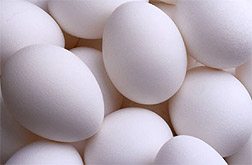
What’s the matter with boiled eggs? It looks like one egg should be as good as another, right? So what makes them different?
You put a pot of water on to boil. When it finally reaches a boil, you add some ordinary chicken eggs to make egg custard, deviled eggs, egg salad, or just individual “hen fruits” to munch on with a free sprinkling of sea salt and a little cracked pepper. But…
Problem Peeling Boiled Eggs?
You experience a problem when you go to peel them. Why don’t your boiled eggs peel right? In fact, sometimes they do, and sometimes they don’t. Why not every time?
Anatomy of an Egg
Within the eggshell lies more than just a white and a yolk. Between the white and the shell is a thin membrane, which is rich in keratin—the protein of fingernails, hair, and horns.
This keratinous membrane forms a strong bond to the egg white in a boiled egg, if it is fresh. A fresh egg white possesses a lower pH (higher acidity) than does the egg white of an egg that is not quite so fresh. As the egg ages, the pH rises and the bond between membrane and white weakens.
Fresh Isn’t Always Best
This means the shell and membrane are more easily removed from the egg—it is easier to peel. A greatly increased number of eggs that are just a bit older, but within the realm of healthy and moderately fresh, will peel just as you want them. So the solution to the peeling problem is allowing just the right amount of aging.
One Final Suggestion
The well-known culinary television program Masterchef Junior, in season 4, recommends eggs be peeled under water. It was claimed that water helps separate the membrane from the egg. So if you are stuck with eggs, some of them fresh and some of them not so fresh, you might apply this recommendation.
Note: You might also enjoy Chemicals to Peel Tomatoes?
References: